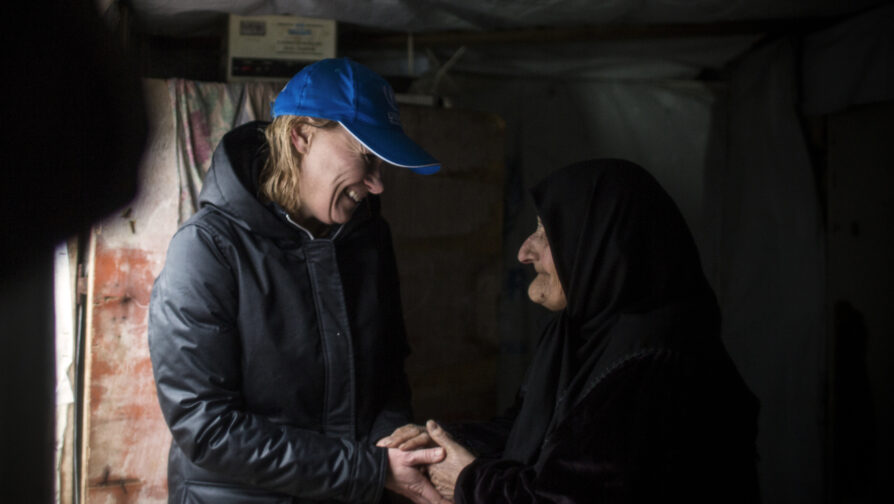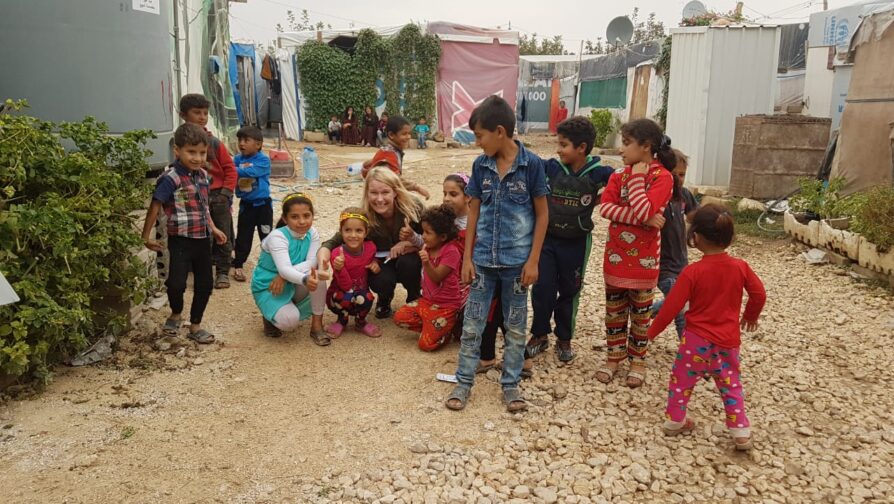“Stories from the Field” is an interview series providing insight into the daily lives of some of our Northern European colleagues, working for the organization all over the world.
“Since I was an adolescent, I’ve felt a very strong call to help people exercise their most basic human rights. I felt it was so unfair that in some places, people can openly express their opinion, sexual orientation or faith, whereas in other countries, people can be detained or tortured for it – that really infuriated me. I wanted a job that would allow me to help create an environment where people could reclaim their rights and freely express themselves without being afraid, and where our differences would be treasured and used to build more accepting, richer and peaceful societies.
I was particularly interested in working for UNHCR because it is an organisation that seeks to do this by working practically with the people and communities themselves, as well as with governments and national authorities, civil society, private sector and UN partners to find ways of achieving this. The range of ways in which we fulfil our mission – from the development of legal standards and advocacy, to practical interventions on the ground to help refugees get access to cash assistance, shelter, medical care, education, etc., makes working for UNHCR very real and meaningful.”

“Lebanon still hosts the largest number of refugees per capita in the world. Lebanon’s response to the Syria crisis has been really amazing,” says Karolina Lindholm Billing. © UNHCR/Diego Ibarra Sánchez
“I work as a Deputy Representative (Protection) for UNHCR in Beirut, Lebanon. This is one of the biggest UNHCR operations in the world. The office here was established in 1962, but it was relatively small until the Syria crisis, and then it quickly grew with the arrival of more than one million Syrian refugees.
A large part of my job is to be in contact with different ministries and institutions, the United Nations, civil society, and other partners to agree on ways to address new or longstanding problems we have identified. The overarching goal of UNHCR’s operation here is to maintain a dignified protection space – including access to documents, education and health care, as well as safeguards to protect against refoulement, or forcible return – for the refugees in Lebanon. In parallel, we help refugees find permanent solutions in their home country or in a third country. We also provide multipurpose cash assistance to the most socioeconomically vulnerable refugees so they can pay for their rent, food, medical costs, and other basic needs without having to resort to begging, child labour, or other harmful means.
A continuous challenge is that the needs of the refugees and the Lebanese communities in which they live greatly exceed our collective resources and capacities to address them. Lebanon still hosts the largest number of refugees per capita in the world. Lebanon’s response to the influx of more than one million Syrian refugees has been remarkable – a true expression of solidarity. When people started fleeing the conflict in Syria in search of safety, Lebanon opened its borders and people their homes. Refugee children were given access to the public schools, and social development centres, primary health care centres and public hospitals were open to those in need. Lebanon’s response to the Syrian refugee situation has in fact inspired several of the provisions in the Global Compact on Refugees and its Comprehensive Refugee Response Framework.
However, it has become increasingly challenging to maintain a dignified protection space for the refugees as the years have gone by. The majority of Syrian refugees in Lebanon live in municipalities and towns where the infrastructure, public services, and waste management were already underdeveloped. Poverty among the refugees has also risen over the past years, as access to livelihoods has been limited and families have depleted any savings they had at the beginning of the crisis. This has forced families to go further into debt in order to pay their rent and other basic necessities, and increased their dependence on a humanitarian safety net for survival. The Vulnerability Assessment of Syrian Refugees conducted in April/May 2019 found that 55 percent of the Syrian refugees were living below the extreme poverty line; today, well over 80% live below the extreme poverty line due the impact of the deep economic and financial crisis in the country, which has been aggravated by the COVID-19 situation. This is not only leading to more families being evicted because they cannot pay their rent, or feeling compelled to take their children out of school to help the family work, but is also leading to more gender-based violence and refugees feeling forced to return because they see no option of survival in Lebanon.
The devastating explosion in the port of Beirut in August 2020 has further accelerated the deterioration of the socioeconomic situation, in addition to causing deaths, trauma, and destruction. More Lebanese are now struggling to make ends meet, and tensions are rising between individuals and communities, as more and more people are competing for the same jobs and resources for survival.
Currently, an important part of my job therefore revolves around raising awareness about the urgency to prevent people from sliding deeper into destitution, to mitigate tensions, and to collaborate with UN partners like UNICEF and the World Food Programme (WFP), the World Bank, donors, and civil society actors on the development of an inclusive social protection system that leaves no one behind.”

“There have been so many over the years, which is why I have continued wanting to contribute to UNHCR’s mission. One experience that comes to my mind is when a refugee girl from Rwanda in Zambia, who so immensely wanted to study to become a chemical engineer, received a DAFI scholarship (UNHCR’s scholarship programme to ensure refugees have access to higher education). She was so happy and proud when she started at the university.
Other good memories relate to when we managed to save refugees at great risk from being deported to their countries through emergency resettlement. I also have many positive memories of situations where policies that enabled refugees to have access to key protections were finally adopted after a lot of awareness-raising, advocacy and technical advice. Many of the examples that come to mind are about achievements that enabled people to exercise their basic rights and get a chance to move on from their situation as refugees, so they no longer had to depend on the assistance of humanitarian organisations. Helping solve practical issues through reaching agreements on changes to policies and practices is a very rewarding part of my job. Concrete examples include when our advocacy helps refugees get their residence permits or other documents. Since most of us have an ID or a passport, we often take for granted our ability to move around without being stopped, questioned, or harassed. But if you do not have an ID or residence permit, it really affects so many aspects of your life.
Something else that comes up strongly in my mind is how all these milestones have been achieved by working together, in partnership with the refugees themselves and all the other stakeholders. As does my deep admiration and appreciation for the hard and dedicated work of UNHCR colleagues, even in times of significant personal difficulties. The past year has been very difficult for my Lebanese colleagues, as they have seen the socioeconomic and health situation in the country rapidly deteriorate, most recently due to the devastating impact of the explosion in Beirut on 4 August. Everyone is affected, with many personally impacted. Despite this, the team has continued delivering critical and lifesaving services to refugees and Lebanese, and found strength in helping others. This is a heartening experience.”
“A couple of months ago, a Syrian refugee set himself on fire because he was unable to pay the rent and food for his family. He died from third-degree burns at the hospital, leaving behind his wife and two sons. Since the sharp deterioration of the socioeconomic situation in Lebanon, our field offices get calls of desperation every day from refugees who are unable to see a way out of this difficult situation, and who plea for UNHCR and humanitarian aid partners to help. And in the last few months, we have started receiving calls from Lebanese living in poverty. Even though you feel that you are working so hard to create an enabling environment in which people can exercise their basic rights and live in dignity, you are constantly living with a feeling of inadequacy because there are so many of the refugees’ and host communities’ legitimate needs we cannot meet.
But this is where one needs to break down the issues into manageable pieces and address them one by one, in a coherent and coordinated way, in partnership with others.”

Karolina Lindholm Billing in UNHCR
Share on Facebook Share on Twitter